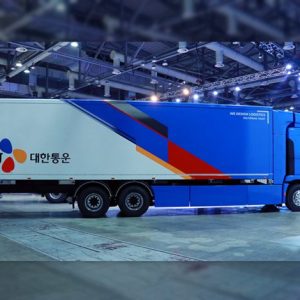
CJ Logistics, a leading innovative supply chain and technology company in South Korea, has announced a strategic partnership with the Korea Ocean Business Corporation (KOBC) to construct large-scale logistics centers in the United States through a public-private collaboration. With a total investment of approximately $457 million (KRW 600 billion), these logistics centers will prioritize handling the import and export cargo of global and South Korean companies, facilitating their overseas expansion and trade activation. Additionally, this initiative aims to strengthen the economic alliance between the U.S. and South Korea by fostering local investment and job creation.
The venture, known as the “North American Project,” entails the construction of large-scale logistics centers across three sites owned by CJ Logistics America, located in key logistics and distribution hubs such as Chicago and New Jersey, totaling 1,181,100 square meters. These sites collectively span an area equivalent to 50 international standard soccer fields. While CJ Logistics plans to contribute the land, KOBC will secure funding for the construction of the logistics centers.
CJ Logistics will assume responsibility for the operation of these three logistics centers, with a primary focus on handling the import and export cargo of global and South Korean companies and e-commerce sellers, thereby supporting their market entry into the U.S. The investment commitment agreement is expected to be signed within the third quarter of this year, and construction is scheduled to commence in the first quarter of next year, with a phased completion targeted from the first half of 2026 to 2027.
In a ceremony held on June 19, Sin-ho Kang, CEO of CJ Logistics, and Yang-soo Kim, CEO of KOBC, signed an agreement to implement this project at CJ Logistics America’s office in Des Plaines, Illinois. Following the agreement, the two CEOs and executives of CJ Logistics and KOBC visited the planned site for the logistics center.

CJ Logistics and KOBC have also committed to active cooperation not only on this project but also on investments in logistics infrastructure in the U.S. and other countries to enhance the global logistics competitiveness of CJ Logistics and South Korea.
Strategically located in three major U.S. cities or logistics hubs, CJ Logistics’ sites offer significant advantages. Elwood, Illinois, adjacent to BNSF and Union Pacific terminals, efficient nationwide transportation and delivery within one to two days are enabled via road and rail networks. Des Plaines, Illinois, is near Chicago, one of the largest U.S. cities and key consumer markets, as well as O’Hare International Airport. Secaucus, New Jersey, offers access to another major consumer market, being situated near New York Harbor, JFK Airport, and New York City.
With the development of these strategic hubs, CJ Logistics is optimizing its global logistics model to meet customer needs for integrated, end-to-end supply chain solutions. It will generate synergy by connecting the newly constructed logistics centers with its existing network of 57 operational logistics centers across the US. This connection will act as a catalyst for innovative growth in the business conducted in the US.

Moreover, with the vision of leading the global logistics industry with world-class technology, CJ Logistics will continue to accelerate and introduce advanced technologies such as automation, big data and AI, leveraging its TES (Technology, Engineering, Systems & Solutions) applications which have been successfully developed in South Korea, and are underway in North America. The company plans to enhance efficiency through the implementation of Autonomous Mobile Robots (AMR), Autonomous Fork Lifts (AFL), and smart packaging systems.
Commenting on the project, Mr. Kang, CEO of CJ Logistics, said, “We are committed to supporting our North America customer base, South Korean companies and e-commerce sellers as they enter the U.S. market. By utilizing our cutting-edge logistics infrastructure and operational capabilities, we aim to increase customer value, serve as a strategic partner to our customers who can benefit from global and multimodal solutions, and expand the ‘K-Wave’ into the business sector.”











